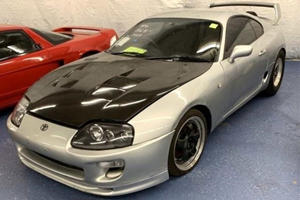If you’re a driver in the United States and you’ve got a Japanese car in your garage, you might want to think twice before taking it out on the open road. According to the US National Highway Traffic Safety Administration (NHTSA), certain Japanese cars – specifically those made between 1992 and 1996 – are illegal to drive on US roads.
What are these banned cars? Well, they’re all JDM (Japanese Domestic Market) models, which means that they were manufactured and sold exclusively within Japan. That means if you have one of these cars, you’re breaking the law and could face fines or even jail time if caught driving it on US roads.
Are you new to copywriting and struggling to come up with ideas that will compel your readers to take action? Or are you a seasoned pro who’s looking for ways to take your writing to the next level? Either way, this guide is for you! In it, we’ll provide tips and advice on how to write copy that sells, from the basics of human psychology down to specific tactics for targeting different customer segments. So whether you’re a beginner or an experienced marketer, this guide has something for you!
What is a JDM Car?
There are a few different types of Japanese Domestic Market (JDM) cars that are not legal to import into the United States. These cars often have unique features that set them apart from their American counterparts, making them illegal for Americans to purchase and drive.
Some of the most common JDM cars that are banned in the US include the Toyota Supra, Nissan Skyline GT-R, Mazda MX-5 Miata, and Honda Civic Type R. Each of these cars has features that make them unique, such as larger engines or unique body styles. If you’re looking for a car that is specifically prohibited from being imported into the US, then a JDM model is likely your best bet.
Why are JDM Cars Illegal in the US?
There are a few reasons why Japan Domestic Market (JDM) cars are illegal in the United States. The first reason is because these cars were not originally intended for sale in the US market. JDM cars were designed and manufactured specifically for the Japanese market, and as such, they may not meet all US safety and emissions requirements. Additionally, some JDM car models may also feature altered engine or suspension settings that could lead to them being classified as illegal racing vehicles.
Another reason why many JDM cars are illegal in the United States is because these cars often contain high-performance features that may not be safe or legal for use on public roads. For example, some JDM cars feature powerful engines that can reach speeds of up to 200 mph or more, while others include upgraded suspensions and braking systems that could make them unsuitable for use on ordinary streets.
In short, there are a number of reasons why many JDM cars are illegal in the US market. While this doesn’t mean that all JDM cars are dangerous or illegal to own, it is important to understand the risks involved before making a purchase.
How to Spot a JDM Car
If you’re looking for a fun and interesting car to drive, you might want to consider checking out a Japanese domestic market car. While these cars may not be as well-known in the United States as some of the more popular imported models, there are still plenty of them out there. In this article, we’re going to help you identify if a Japanese domestic market car is legal or illegal in the United States.
The first thing you need to do is figure out whether or not the car falls under one of the specific exemptions listed in the United States Code. There are a few exemptions that pertain specifically to Japanese domestic market vehicles, but most of them have been replaced by more general exemptions that apply to all foreign manufactured vehicles. If you can’t find an exemption listed specifically for your car, then it likely isn’t covered and will be considered illegal in the US.
Another factor to consider is how similar the vehicle is to an existing model that’s already registered and licensed in the US. If the vehicle is substantially different from an existing model or doesn’t correspond at all with an existing model, it’s likely going to be considered illegal and subject to penalties.
Overall, if your car falls under one of the exemptions listed in U.S. Code or it corresponds closely with an existing model that’s already registered and licensed in the US, it’s unlikely that it will be classified as illegal and subject to penalties. However
Conclusion
If you are looking to buy a Japanese Domestic Market (JDM) car and plan on bringing it over to the United States, you may be in for some trouble. JDM cars are often considered illegal imports into the US because of their high-quality build and performance capabilities. If you were planning on importing your JDM car without paying taxes or obtaining a waiver from the government, you may want to reconsider. There are many hoops that must be jumped through in order to bring a JDM car into the United States legally, and unless you know exactly what you’re doing, it is likely not worth the hassle.
Read Also : What Is WPC15, And How Truly does Its Live Login Dashboard Work?

